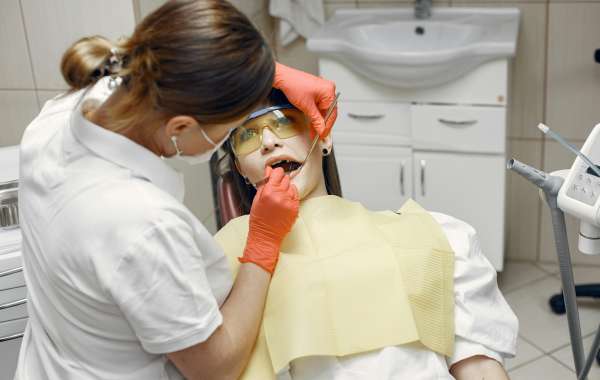Emergencies don't wait for office hours, and dental problems can arise at any time, often when least expected. Understanding the scope of dental emergencies is fundamental. These include severe toothaches, knocked-out teeth, broken fillings, dental abscesses, and oral injuries, all requiring immediate attention to prevent further complications or permanent damage.
Services Offered by 24-Hour Emergency Dentists 24-hour emergency dentists specialize in providing prompt care round the clock. They offer immediate appointments and possess the expertise and equipment necessary to handle a wide range of urgent dental issues effectively. This availability is crucial for those facing dental emergencies outside regular business hours, ensuring they receive timely treatment without unnecessary delays.
Emergency dental services encompass a variety of treatments tailored to address urgent dental issues comprehensively. These may include root canal therapy for severe infections, dental crown placements for broken teeth, tooth extraction for irreparable damage or impaction, and treatments for dental trauma such as knocked-out teeth or fractured jaws. Emergency dentists are trained to assess and manage these situations efficiently, providing relief and preventing further complications.
Where to Find Emergency Dental Treatment Knowing where to find Emergency dental treatment Manchester is vital. Reliable emergency dental clinics in your area can provide immediate relief and necessary care. They offer specialized services tailored to emergency situations, including pediatric emergency dentistry, ensuring all ages receive appropriate and timely dental care when it's most needed.
Emergency dental clinics are equipped with state-of-the-art technology and facilities to handle various dental emergencies effectively. This includes digital imaging for accurate diagnostics, intraoral cameras for detailed examinations, and advanced anesthesia techniques for pain management. By leveraging these resources, emergency dentists can deliver prompt and precise treatments, alleviating pain and restoring dental health swiftly.
Preparing for Dental Emergencies Preparation is key in managing dental emergencies. Creating a dental emergency kit with essentials such as pain relievers, sterile gauze, temporary dental filling material, and an emergency contact list for dental clinics offering urgent dental care in Manchester can help alleviate discomfort temporarily until professional treatment is obtained. Knowing when to seek emergency dental care and the steps to take before reaching the dentist can also streamline the process and improve outcomes during critical situations.
Educating oneself and family members about dental emergency protocols can be invaluable. This includes understanding how to handle common dental emergencies at home temporarily, such as managing toothaches with over-the-counter pain relievers and avoiding chewing on the affected side. Awareness of emergency dental services available in the community and their contact information can expedite access to care when every moment counts.
Costs and Insurance Coverage Costs associated with emergency dental treatment can vary. Understanding potential expenses and available insurance coverage for Emergency dental treatment Manchester is essential for making informed decisions. Many insurance policies cover emergency dental services, but it's important to verify coverage and understand payment options and any financial assistance available to manage costs effectively.
Real-life case studies and patient experiences highlight the importance of prompt emergency dental care. These stories illustrate successful treatments and outcomes, emphasizing the critical role of 24-hour emergency dentists in providing timely and effective care during dental crises. Patient testimonials further underscore the value of accessible emergency dental services in communities.
Tips for Preventing Dental Emergencies Preventing dental emergencies begins with proactive dental care practices. Regular dental check-ups, professional cleanings, and preventive treatments such as dental sealants and fluoride applications can significantly reduce the risk of emergencies. Practicing good oral hygiene at home, including brushing twice daily, flossing, and using mouthwash, helps maintain optimal dental health and minimizes the likelihood of developing dental issues that may require urgent care.
Wearing protective gear during sports and recreational activities, such as mouthguards for contact sports, can prevent dental injuries and trauma. Avoiding chewing on hard objects, such as ice or pens, and refraining from using teeth as tools for opening packages or bottles can also prevent dental emergencies related to tooth fractures or damage.
The Role of Technology in Emergency Dentistry Advances in dental technology have revolutionized emergency dentistry. From digital imaging for accurate diagnostics to telemedicine options for initial consultations, technological innovations enhance the efficiency and precision of emergency dental care. These advancements ensure patients receive optimal care even during urgent situations, improving treatment outcomes and patient satisfaction.
Digital radiography and cone-beam computed tomography (CBCT) provide detailed images of the teeth and surrounding structures, aiding emergency dentists in diagnosing dental emergencies accurately. Intraoral cameras enable real-time visualization of the oral cavity, allowing dentists to identify issues such as fractures or infections promptly. CAD/CAM technology facilitates the creation of same-day dental restorations, such as crowns or bridges, for patients requiring immediate treatment.
Telemedicine platforms allow patients to consult with emergency dentists remotely, providing initial assessments and recommendations before scheduling an in-person visit. This virtual approach enhances accessibility to emergency dental care, particularly in situations where immediate travel to a dental clinic may not be feasible.
Community Resources and Support Community resources and support networks play a significant role in promoting dental health awareness and supporting individuals facing dental emergencies. Local initiatives, such as free dental screenings or educational workshops on emergency dental care, raise awareness about preventive measures and available services in the community. Collaboration between emergency dental clinics and community organizations facilitates access to care for underserved populations and ensures individuals receive timely assistance during dental crises.
Additional Subtopics:
Emergency Dental Procedures Emergency dental procedures encompass a range of treatments aimed at addressing urgent dental issues promptly and effectively. Common emergency dental procedures include:
- Root Canal Therapy: Used to treat severe infections or abscesses affecting the tooth pulp.
- Dental Crown Placement: Restores and protects teeth with extensive decay or fractures.
- Tooth Extraction: Removes irreparable teeth or impacted wisdom teeth causing pain or infection.
- Treatment for Dental Trauma: Addresses injuries such as knocked-out teeth, fractured jaws, or lacerations to the oral tissues.
Emergency dentists are trained to perform these procedures with precision, using advanced techniques and materials to restore dental function and alleviate pain. Immediate intervention can prevent complications and preserve oral health, promoting faster recovery and optimal outcomes for patients experiencing dental emergencies.
Pediatric Emergency Dentistry Children are vulnerable to dental emergencies due to active lifestyles and developmental stages. Pediatric emergency dentists specialize in addressing dental issues specific to children, such as:
- Knocked-Out Baby Teeth: Immediate evaluation and management to preserve oral health and prevent complications.
- Dental Trauma from Falls or Sports Injuries: Comprehensive assessment and treatment to minimize pain and restore dental function.
- Emergency Dental Care for Special Needs Children: Individualized care and support for children with developmental disabilities or medical conditions affecting oral health.
Pediatric emergency dentists prioritize gentle and compassionate care, ensuring young patients feel comfortable and secure during emergency dental visits. Early intervention and preventive measures promote positive dental experiences and long-term oral health for children and adolescents.
Emergency Dental Care During Travel Dental emergencies can occur while traveling, making it crucial to know where to find emergency dental services in unfamiliar locations. Researching local emergency dental clinics before traveling and keeping essential contact information handy can help mitigate stress and ensure prompt treatment in case of an unexpected dental issue abroad.
Maintaining good oral hygiene practices while traveling, such as brushing twice daily and using fluoride toothpaste, reduces the risk of dental emergencies related to decay or infection. Packing a dental emergency kit with essentials such as pain relievers, sterile gauze, and temporary dental filling material prepares travelers to manage dental issues temporarily until professional care is obtained.
Conclusion In conclusion, access to 24-hour emergency dentist services is crucial for addressing dental emergencies promptly and effectively. This comprehensive guide has explored the importance of immediate dental care, the extensive services provided by emergency dentists, practical tips for managing and preventing dental emergencies, the impact of technology in enhancing emergency dental care, and additional subtopics such as emergency dental procedures, pediatric emergency dentistry, emergency dental care during travel, and community resources supporting dental health.
By staying informed, prepared, and proactive in dental care practices, individuals can confidently navigate unexpected dental issues and prioritize their oral health effectively. With timely access to emergency dental services and support from community resources, individuals can receive the necessary care and assistance during dental crises, ensuring optimal outcomes and long-term dental health.








